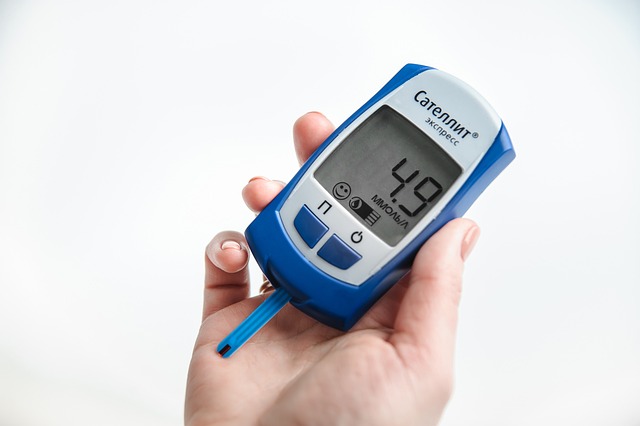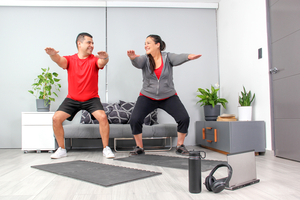Everyone has stress in their lives. It can come from sources such as exams and other important events, as well as concerns about jobs, money, relationships, children, and the health of yourself and family. Sometimes, stress can seem overwhelming.
Managing stress better can reduce possible negative effects of stress, such as anxiety, headaches, an upset stomach, and increased blood sugar and blood pressure. Lark can help you with stress management techniques, such as deep breathing, letting go, and visualization. Increasing physical activity is another stress management technique.
Exercise is a simple way to manage stress, and Lark can help you take advantage. Here is why exercise can help manage stress, and how to get more exercise in your daily life.
How Exercise Can Affect Stress
A body of research says that exercise can help manage stress. This may be largely due to the effect of physical activity on hormones. Cortisol and adrenaline are stress hormones that can raise heart rate, make you feel anxious, and raise blood pressure and blood sugar. Exercise can lower their levels. Exercise may also enable you to hand stressful events without feeling as many negative feelings or having as much of a cortisol response as you might have had if you had not exercised.
At the same time, exercise leads to higher levels of chemicals called endorphins. These boost mood and improve your sense of well-being. That can be useful if stress has been getting you down. You may have experienced this effect if you have ever felt strong or happy, or less anxious, after working out.
Not only can exercise help reduce the effects of stress hormones, but it can also affect health in ways that are opposite to those of stress. For example, exercise can increase insulin sensitivity and lower blood sugar, lower blood pressure, and reduce chronic inflammation, which is a risk factor for conditions such as heart disease and type 2 diabetes.
Exercises for Reducing Stress
Which exercises can you do to reduce stress? Take your pick! Many types of exercise can help manage stress.
Aerobic exercise is what many people think of when they think of exercise, and it may be what is mentioned most often. It can improve self-esteem and measures of mental health, such as anxiety, stress, and insomnia.
Recommendations for maintaining health and managing many conditions are to get at least 150 minutes per week of aerobic activity. Examples include brisk walking, dancing, gardening, swimming, and playing tennis.
Other forms of exercise can also reduce stress. Tai chi, for example, may reduce depression and anxiety symptoms. Tai chi is a practice that originated in China and involves flowing movements and can improve balance, flexibility, and strength. The concentration required to perform tai chi can contribute to stress reduction. Similarly, some forms of yoga can help manage stress and reduce anxiety and insomnia.
Getting More Stress Management Bang for Your Exercise Buck
Making certain changes when you exercise can help lower stress even more. For example, socializing can lower stress, so why not consider using exercise time as social time sometimes? Options include going to the gym with a buddy, walking with friends or neighbors, and playing basketball on a team.
You do not need to socialize every time to max out on the stress-busting benefits of exercise. If you love listening to music, you feel the need to stay caught up on the news, or you are craving a good escape with your favorite movie or TV show, go for it while you work out.
There may be additional stress-busting benefits of practicing muscle meditation, which just means doing repetitive exercises. For example, walking involves putting one foot in front of the other again and again, and biking involves pushing pedals around and around. Swimming and using the elliptical machine are also repetitive motions.
If you have time, making exercise a full experience regularly or every so often can boost positivity. For example, a long, post-workout stretch while chatting with friends or listening to music can be both relaxing and energizing. You can also treat yourself to a post-workout coffee - leave out the sugary syrups for best results - or a nourishing bowl of oatmeal or other treat.
Overcoming Barriers to Exercise without Adding Stress
Some people use exercise as a coping mechanism and increase their physical activity levels when stressed, but many others tend to be less active during periods of stress. Everyone faces barriers to exercising. When you are particularly stressed out, barriers may seem harder to overcome.
Exercising can be a simple way to manage stress, and it is something that should be done anyway to improve health and prevent or manage chronic conditions. As it lowers blood sugar, blood pressure, and health risks, physical activity can also lift mood, lower stress hormone levels, and make stressful events seem more manageable. Lark can help you with activity and other ways to manage stress as you work on other health goals with this friendly and encouraging coach.
References
- Childs E, de Wit H. Regular exercise is associated with emotional resilience to acute stress in healthy adults. Front Physiol. 2014;5:161. Published 2014 May 1. doi:10.3389/fphys.2014.00161
- Gilani SRM, Feizabad AK. The effects of aerobic exercise training on mental health and self-esteem of type 2 diabetes mellitus patients. Health Psychol Res. 2019;7(1):6576. Published 2019 Mar 11. doi:10.4081/hpr.2019.6576
- Wang F, Lee EK, Wu T, et al. The effects of tai chi on depression, anxiety, and psychological well-being: a systematic review and meta-analysis. Int J Behav Med. 2014;21(4):605‐617. doi:10.1007/s12529-013-9351-9
- Pascoe MC, Thompson DR, Ski CF. Yoga, mindfulness-based stress reduction and stress-related physiological measures: A meta-analysis. Psychoneuroendocrinology. 2017;86:152‐168. doi:10.1016/j.psyneuen.2017.08.008
- Maddux RE, Daukantaité D, Tellhed U. The effects of yoga on stress and psychological health among employees: an 8- and 16-week intervention study. Anxiety Stress Coping. 2018;31(2):121‐134. doi:10.1080/10615806.2017.1405261
- Stults-Kolehmainen MA, Sinha R. The effects of stress on physical activity and exercise. Sports Med. 2014;44(1):81‐121. doi:10.1007/s40279-013-0090-5



.jpg)








.webp)







